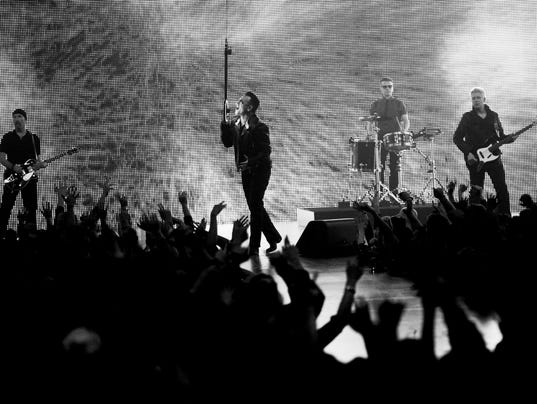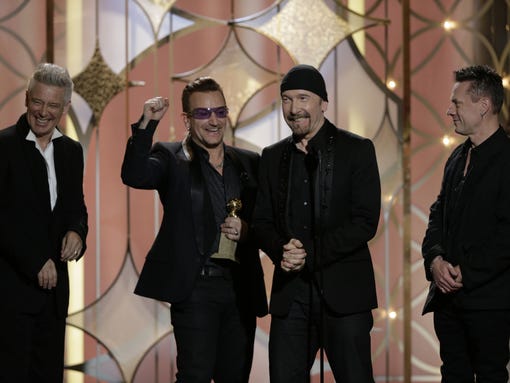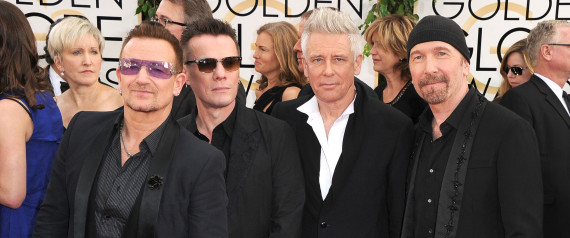
The following extended Q&A with U2's long-time manager Paul McGuinness is from the new issue of Billboard.
Few managers are so closely associated with one act as Paul McGuinness has been with U2, a group he took from a fledgling band of dubious musicianship playing Dublin bars to where it is widely considered the biggest group in the world.
News broke late last year that McGuinness would step back from day-to-day duties for U2 after more than 35 years, handing the reins to Madonna manager Guy Oseary, as the band’s management shifts from McGuinness’ Principle Management to the management division of Live Nation, with whom U2 signed a 12-year touring/merchandising/e-commerce pact in 2008.
In a statement, U2 said, in part, “Paul has saved us from ourselves many times over and we would not be U2 without him,” describing his ongoing role as “mentor in chief.”
The move represents a monumental change for McGuinness, who has devoted more than half of his life to guiding U2. While he has directed countless significant career moves along the way, perhaps the most visionary was realizing the potential of a band he recalls “weren’t very good at all” when he was first introduced to the group by influential Irish music writer Bill Graham -- though McGuinness adds that his own lack of musical sophistication didn’t make the band’s lack of chops an issue.
But McGuinness did have the vision to recognize U2’s onstage alchemy -- an intense connection between band and audience -- and unlimited potential. The fiery ambition and creativity of both band and manager led to a career unlike any in pop history.
In recognition of his lifelong achievements and vision in moving the music industry forward, McGuinness will be the recipient of the 2014 Billboard Industry Icon Award. The honor will be presented at MIDEM in Cannes on Feb. 2. The inaugural Industry Icon Award was presented in 2012 to Sire Records founder/CEO Seymour Stein and in 2013 the honor went to Beggars Group founder/chairman Martin Mills.
Born in post-war Germany in 1951, McGuinness’ father was an officer in the Royal Air Force from Liverpool and his mother a schoolteacher from County Kerry in Ireland. The global perspective of U2’s development came naturally to McGuinness, who grew up on RAF bases around the world in such places as Malta, Yemen and various parts of England, first coming to Ireland for boarding school in 1961.
Raised in a non-musical household, McGuinness still was drawn to a career in the arts. He directed plays and tried his hand at journalism at Dublin’s Trinity College. After a brief career in film production (including a notable stint in the cult classic “Zardoz” with Sean Connery), McGuinness shifted his focus to music, working with such obscure Irish bands as Spud before that fateful introduction to U2 in 1978.
In a revealing, wide-ranging interview, Billboard picks up the story there, at the beginning of a relationship that forever changed the history of music.
Billboard: What was your first impression of U2?
Paul McGuinness: They were pretty smart -- that was the first thing that was very clear. They were ambitious, they were interested in what was going on with other bands, and were very committed to performance. Bono particularly was down the front of the stage, looking for eye contact with the audience. Even at a young age, he was a very charismatic frontman.
What were some of your early wins in managing U2?
It was very hard to get a record deal. I thought they were so good, and it was so obvious that they would develop, that it surprised me greatly that pretty well every record company in London passed on them. We had some success getting A&R men to see them, but we had either bad luck, the shows weren’t very good or the A&R guys just didn’t see it. It took a surprisingly long time to get a deal, and in the end the deal we got from Island was the only one on offer.
We were actually very lucky to get signed by Island, because their culture suited us perfectly. There seemed to be a policy of letting the artist be in charge. I’m sure it wasn’t as simple as that, but there was respect for the artist. What I did not realize at the time was that it was very important to have [Island founder] Chris Blackwell’s involvement. He wasn’t very involved in the signing of the band. He became a big supporter later, but the people who really signed the band at Island Records were [Island A&R man] Nick Stewart, press officer Rob Partridge and [talent scout] Annie Rosebury.
Were such superlatives as “biggest band in the world” even in your head at that point?
The only reason I wanted to manage a band at all was because I wanted to manage a very big band. I certainly wasn’t doing it philanthropically.
U2’s first three albums were critically acclaimed but less than blockbusters, and during that time the band really developed its performance chops. Did you always consider the live thing as a critical part of a band’s career?
We always realized that there were two parallel careers: one live and one on record. We felt instinctively in the early days that it was important to be a great live band so that we were not dependent upon the success of the records. The first album ["Boy," 1980] was, as you say, critically well-received, but didn’t have any hits. The hits off that album came much later. The second album ["October," 1981] was recorded in a bit of a hurry and, looking back on it, quite weak. The third album ["War," 1983] was a No. 1 album in the U.K., and ’round about that time the live album we did at Red Rocks [in Colorado, "Under a Blood Red Sky"] and the accompanying film [“Live at Red Rocks”] really did a lot to break the band in all countries. "Unforgettable Fire" in 1985 went to No. 1 in most European countries and did respectably in the U.S.
It was then that we started to play in arenas in the U.S. We had built up a very strong live base in America. I believed that was very important, and in the early ’80s we would spend three months of every year in the U.S.
One of the most important connections we ever made was with [agents] Frank Barsalona and Barbara Skydel at Premier Talent, [who] really believed in the band. They could see that it was a great live act. I learned an awful lot just from talking with Frank. I used to sit in his office until late at night when everyone else had gone home, and Barbara was our responsible agent. They were both major forces in the success of the band.
In Europe and other territories outside North America we had an equally brilliant agent in Ian Flooks and his company Wasted Talent -- the hot agency in Europe when we started out. They picked up on U2 right at the beginning, and we did every date we ever did in Europe for either them or an agent in Ireland called Dave Kavanagh. And we worked with promoters like Leon Ramakers and Thomas Johanssen in Europe since day one, as well as Michael Coppel in Australia.
Working with agents was fundamental to the early success of U2. The band wanted to be good live, and they were prepared to put a lot of time and effort into touring, and so was I. We were not prepared to be the kind of routine visiting English punk band. I attended pretty well every show they ever did.
Which shows stand out?
Many of our great shows have been at Madison Square Garden. It’s a very special place for us, and New York was always a very important market for us because it was such a great live market. We used to play multiple nights at the Ritz [now Webster Hall], and the money we made off those dates would subsidize the rest of the tour.
New York had very weak radio in the early ’80s. There were [rock stations] WNEW and WPLJ, and neither of those stations played U2. We were supported by a station in Long Island called WLIR. Really, we broke New York through performance.
























